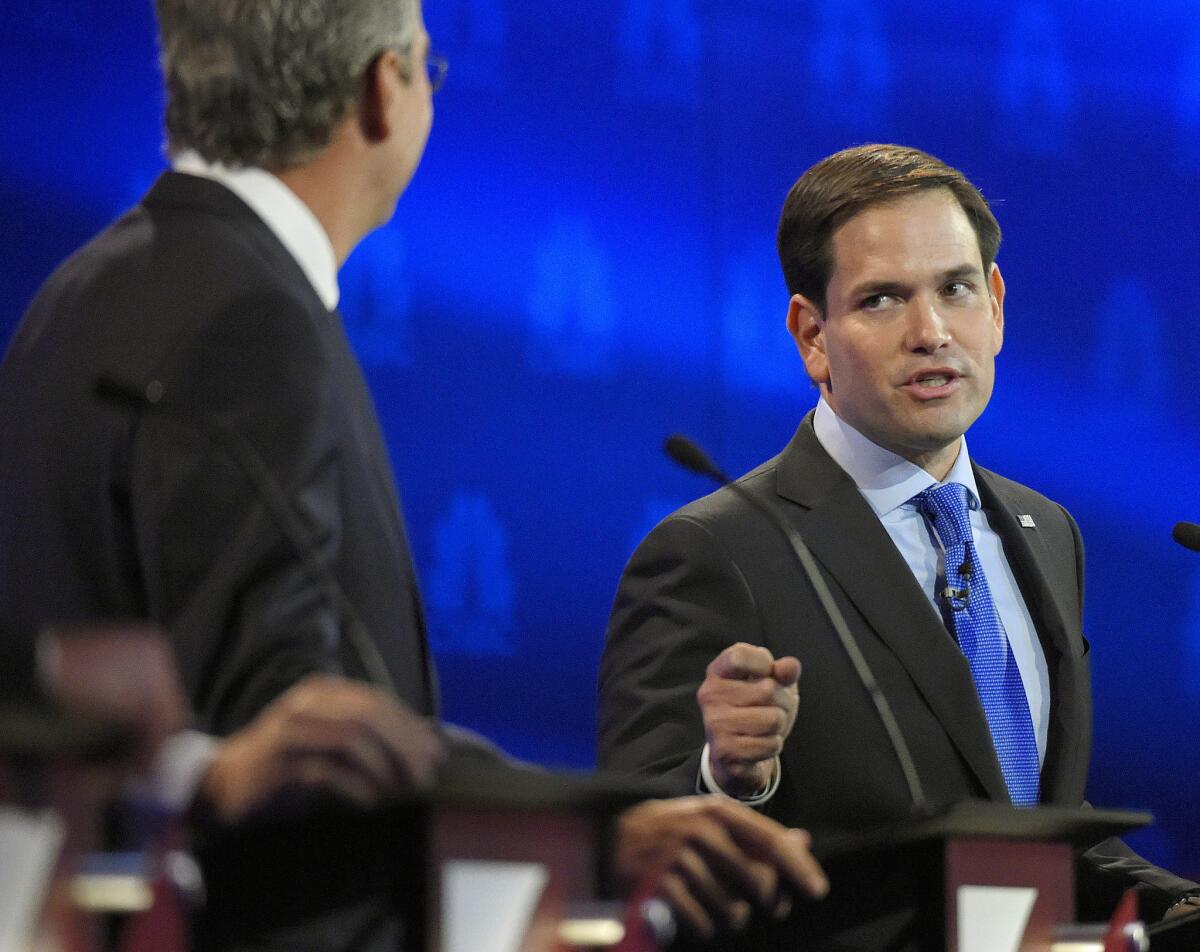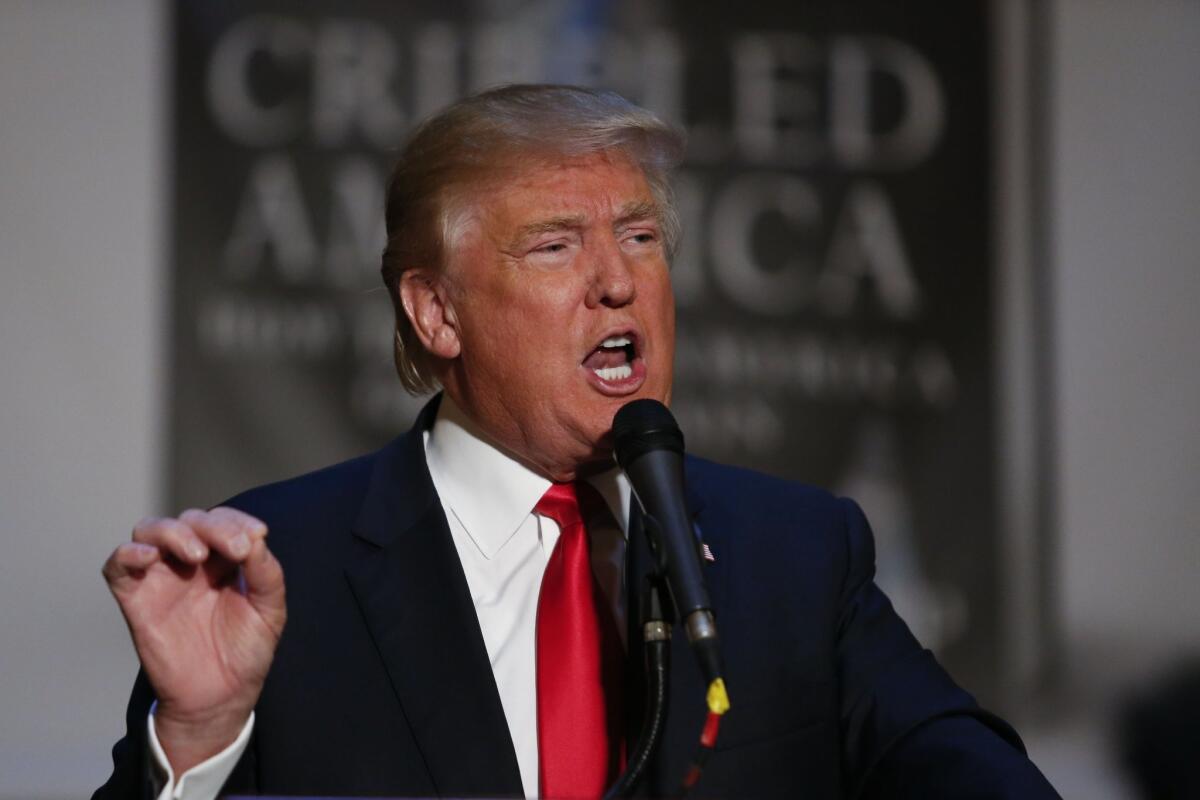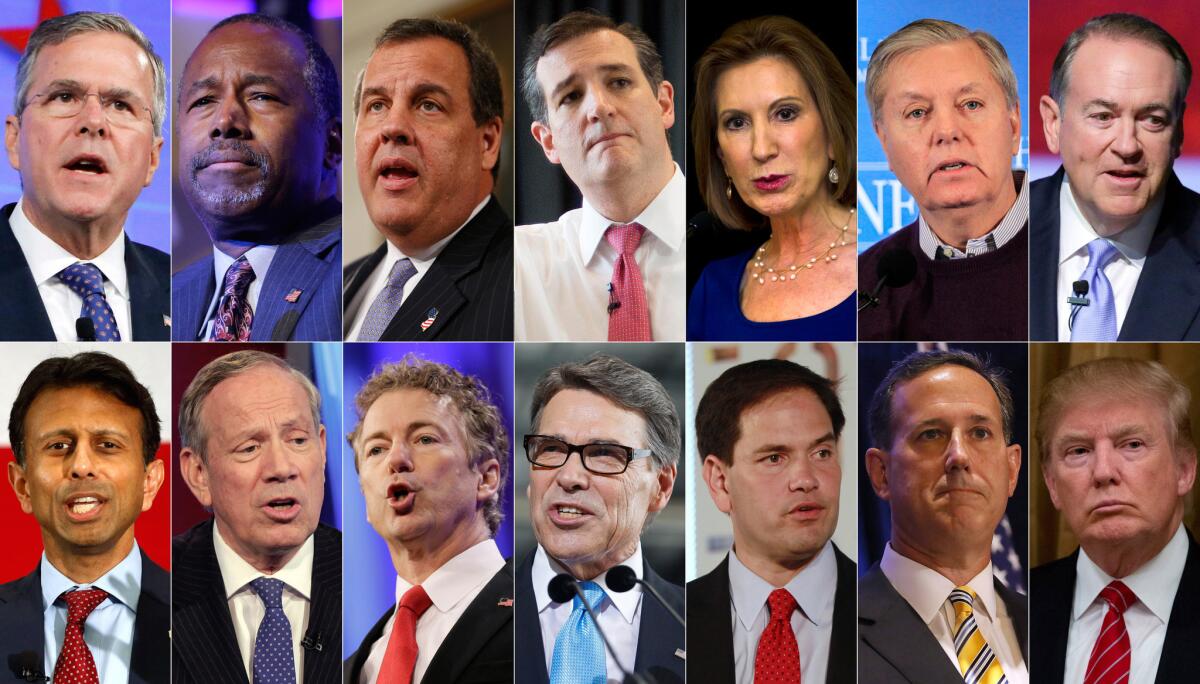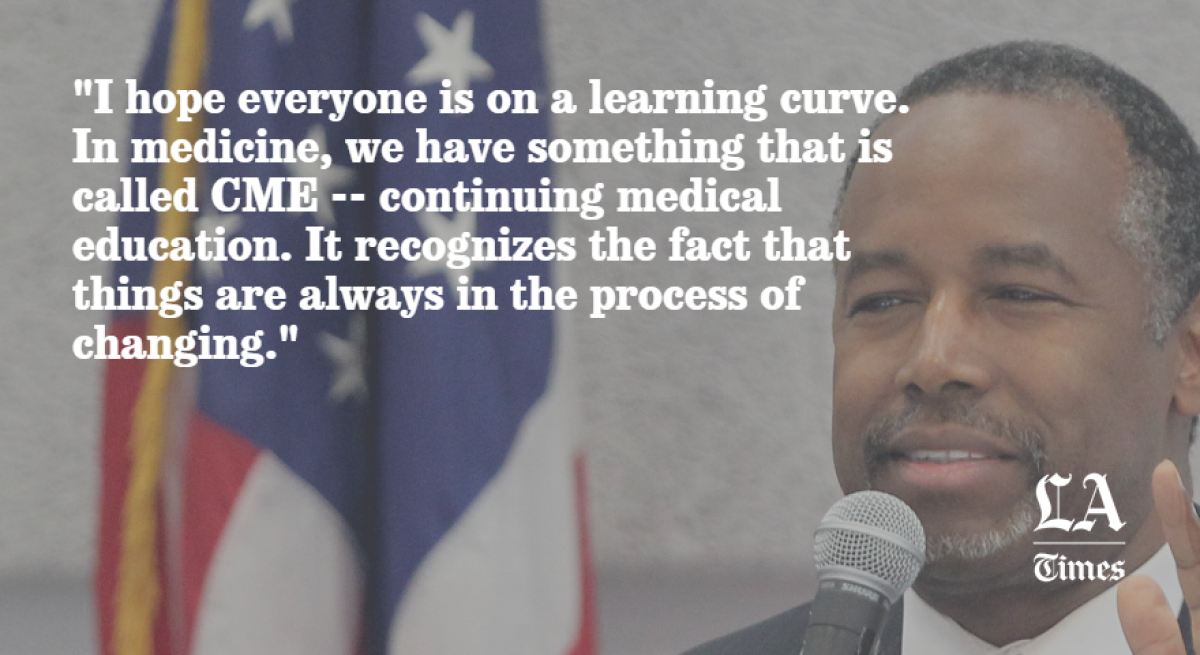Donald Trump calls for waterboarding to combat Islamic State
- Share via
By the numbers
Welcome to Trail Guide, your host through the wilds of the 2016 presidential campaign. It's Sunday, Nov. 22, and here's what we're talking about:
- Donald Trump says waterboarding should be used to battle ISIS
- Ben Carson notes he has room to improve when it comes to foreign policy
- Marco Rubio supports bill banning Syrian refugees from entering the country
- A look at how Democrats in Iowa are trying to piece together a win for Hillary Clinton
- Stay-up-to-date on the 2016 presidential field
Marco Rubio voices support for bill banning Syrian refugees

Marco Rubio, right, and Jeb Bush, argue a point during the Republican presidential debate at the University of Colorado on Oct. 28, 2015, in Boulder.
Sen. Marco Rubio, one of a handful of lawmakers vying for the Republican presidential nomination, said Sunday he’s backing a measure in Congress that would place limits on Syrian refugees trying to enter the United States.
The Florida senator cited a lack of confidence in U.S. officials' ability to effectively vet refugees as the prime reason for his support of the bill. It passed the House this week and is headed to the Senate, where its chances are uncertain. The Obama administration has proposed admitting at least 10,000 Syrian refugees into the United States next year, but the bill would essentially halt the effort. The White House has said President Obama would veto it should it reach his desk.
“We can’t allow anyone in this country that we can’t vet,” Rubio said on "Fox News Sunday." “And I believe that the vast majority of refugees that are trying to come here are people that we will not be able to vet.”
The issue has propelled to the forefront of the presidential race in recent weeks, with Democrats and Republicans divided.
Rubio is joined by his Senate colleagues, Ted Cruz of Texas and Rand Paul of Kentucky, who are also seeking the GOP nomination, in his opposition to the allowing Syrian refugees into the country. On the Democratic side, front-runner Hillary Clinton supports the White House proposal to house refugees fleeing the war-torn country.
Rubio did offer some leeway in possibly allowing some refugees into the country.
“Does common sense still apply? Of course, it does. A 5-year-old orphan, a 90-year-old widow, a well-known Chaldean priest, these are obviously common-sense applications that you can clearly vet them just by common sense,” he said. “But what about someone who doesn’t fit that profile? There is no reliable database that we can rely on.”
In recent weeks, Rubio has surged some in his quest for the nomination. In several state polls from Iowa and New Hampshire he’s consistently improved.
However, rivals like former Florida Gov. Jeb Bush have assailed Rubio for his dismal attendance record in the Senate as he runs for president. Rubio has brush aside the criticism, noting that he's able to effectively toggle between the two tasks.
In Iowa, Ben Carson looks to capture evangelical support
Ben Carson is appealing to evangelical voters in Iowa. On Sunday, he made the rounds at a church in Tipton, Iowa. Read this recent piece by The Times' Seema Mehta about Carson's appeal to Christian conservatives in the Hawkeye State.
Donald Trump says waterboarding should be used in fight against ISIS

(FILES) In this November 3, 2015 file photo, Republican presidential candidate Donald Trump speaks during a press conference during a event to launch his new book “Crippled America: How to Make America Great Again” at Trump Tower in New York. Trump called November 22, 2015 for the return of waterboarding, a near-drowning interrogation technique widely denounced as torture, saying it was “peanuts” compared to what Islamic State is doing. AFP PHOTO/Kena BetancurKENA BETANCUR/AFP/Getty Images ** OUTS - ELSENT, FPG, CM - OUTS * NM, PH, VA if sourced by CT, LA or MoD **
Donald Trump outlined more controversial steps he would take in the name of national security if he becomes president, calling Sunday for the return of the widely discredited interrogation technique of waterboarding and repeating that he’d track Muslims and shutter mosques in the U.S.
Insisting that the United States “would have to be strong,” Trump said that waterboarding Islamic State extremists would be “peanuts” compared with the group’s beheadings of American and British hostages.
“I would bring it back. I think waterboarding is peanuts compared to what they’d do to us … what they did to James Foley when they chopped off his head,” Trump said on ABC's "This Week" referring to the American journalist beheaded by Islamic State in August 2014. “That’s a whole different level and I would absolutely bring back interrogation -- and strong interrogation.”
In the wake of the Sept. 11, 2001, attacks, the Bush administration turned to waterboarding, a method in which a suspect is made to feel like he’s drowning, to try to extract information from Al Qaeda suspects. The effort proved mostly futile in producing useful intelligence about planned attacks and led to false confessions, according to the executive summary of a long-delayed Senate report that came out late last year. President Obama formally ended the program when he took office in 2009.
Trump, though, said he sees waterboarding as a useful counterbalance to the violent murders committed by Islamic State.
“You know, they don’t use waterboarding over there; they use chopping off people’s heads,” he said.
Trump also doubled down on his calls for a database to monitor Muslims and the possibility of shuttering mosques.
At a rally in Birmingham, Ala., on Saturday, Trump again brought Muslims to the forefront – a topic he’s focused on in the aftermath of the Paris terror attacks. Trump told the estimated 10,000 people in attendance he saw images of Arab Muslims cheering in New Jersey after the Sept. 11 attacks.
“There were people that were cheering on the other side of New Jersey where you have large Arab populations,” he said on “This Week.” "They were cheering as the World Trade Center came down. I know it might be not politically correct for you to talk about it, but there were people cheering as that building came down -- as those buildings came down, and that tells you something. It was well covered at the time.”
Rumors have surfaced over the years about Muslims cheering in Paterson, N.J., as the twin towers collapsed, but those claims were discounted by local police at the time.
During the rally, a protester from the Black Lives Matter movement heckled the real-estate mogul. When asked about it in a separate interview Sunday on “Fox & Friends,” Trump suggested the protester should have been “roughed up.”
“Maybe he should have been roughed up because it was absolutely disgusting what he was doing," Trump said. “The man that was — I don't know, you say 'roughed up' — he was so obnoxious and so loud. He was screaming. I had 10,000 people in the room yesterday — 10,000 people. And this guy started screaming by himself.”
Since he entered the GOP presidential race over the summer, Trump has catapulted to the top of the crowded field, tapping into an electorate discontented with the political establishment. And with less than three months until ballots are cast, he remains toward the top of polls in the early voting states of Iowa, New Hampshire and South Carolina.
Trump also stoked fears among the Republican Party that if he does not capture the party's nomination, he will seek a third-party run for president. Though he signed a pledge months ago promising to support the Republican nominee in what was seen as something of a peace agreement between Trump and party leadership, he said Sunday that he’s still considering running as an independent.
“I will see what happens. I have to be treated fairly. You know, when I did this, I said I have to be treated fairly. If I'm treated fairly, I'm fine,” he said Sunday on “This Week.”
Bobby Jindal ended his campaign last week, so who remains in the 2016 presidential race?

This combo made from file photos shows the 2016 Republican presidential candidates who declared their candidacy as of July 12, 2015. Top row, from left, Former Florida Gov. Jeb Bush, retired neurosurgeon Ben Carson, New Jersey Gov. Chris Christie, Texas U.S. Sen. Ted Cruz, former Hewlett-Packard CEO Carly Fiorina, South Carolina U.S. Sen. Lindsey Graham, and former Arkansas Gov. Mike Huckabee. Bottom row, from left, Louisiana Gov. Bobby Jindal, former New York Gov. George Pataki, Kentucky U.S. Sen. Rand Paul, former Texas Gov. Rick Perry, Florida U.S. Sen. Marco Rubio, former U.S. Sen. Rick Santorum, and real estate mogul Donald Trump. (AP Photo)
Republican Louisiana Gov. Bobby Jindal ended his presidential campaign last week. Stay up to date on the field of Democratic and Republican presidential hopefuls.
By the numbers
Get the L.A. Times Politics newsletter
Deeply reported insights into legislation, politics and policy from Sacramento, Washington and beyond. In your inbox twice per week.
You may occasionally receive promotional content from the Los Angeles Times.








